Life In Syria Now: Russian Airstrikes Target Children, Hospitals As Aleppo Runs Out Of Food
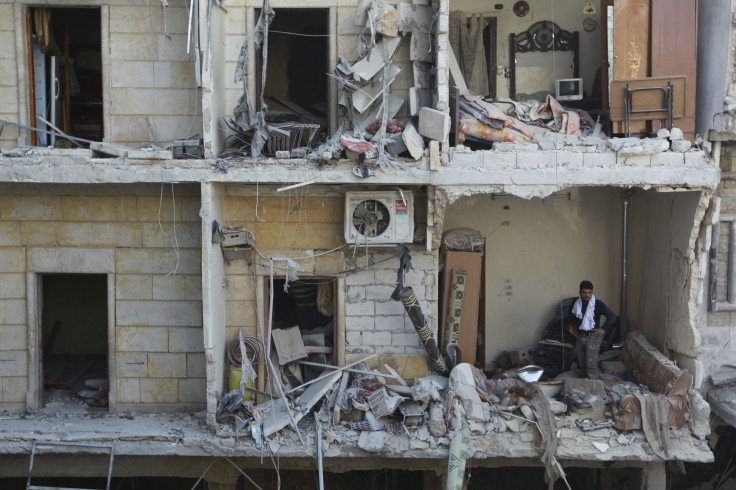
Abdulkafi Alhamdo crushes rice and mixes it with lentils to feed his 9-month-old daughter, Lamar, in their kitchen in eastern Aleppo. He serves the homemade formula made from the only food left in his home on a spoon to Lamar, whose teeth have only recently started to grow in.
Alhamdo spends every day with his daughter and his wife, who has been sick for 15 days with a fever. As his wife's health has declined and her breastmilk dried up, Russian-led airstrikes brought a massive wave of explosions and reported chemical weapons warfare to the family’s neighborhood this week in the latest military campaign in Syria's civil war. After four years of conflict, Alhamdo wonders how his daughter, who can barely digest his makeshift meals, will be able to grow or lead a normal life.
"You can’t imagine how badly in need people are for food, clean water, electricity, fuel, it’s unbelievable," said Alhamdo, a teacher in the war-stricken city who described to International Business Times this week what life had become for his family through voice recordings on the encrypted messaging service WhatsApp. "Hell itself would be paradise compared to Aleppo these days."
Meet Abdulkafi Alhamdo: father, teacher, proud Syrian. This is his message. Read his story https://t.co/stSszxz8hI pic.twitter.com/MXdJ9P6diZ
— Intl. Business Times (@IBTimes) November 23, 2016
As the Syrian war escalates, President Bashar Assad's regime has grown increasingly hostile to international organizations entering the country, blocking off most of Aleppo and making aid envoys over the Turkish border into the besieged city nearly impossible. Syrians bracing for a harsh winter with subzero degree temperatures are quickly running out of food, among other limited provisions. Meanwhile, Westerners say they are now resorting to using fake Syrian names, among other risksy tactics, to deliver aid to Aleppo's remaining 250,000 residents. For those who call Aleppo home, everyday life has gone from bleak to harrowing, even as some remain optimistic that the war could one day end, bringing peace and security back into their lives.
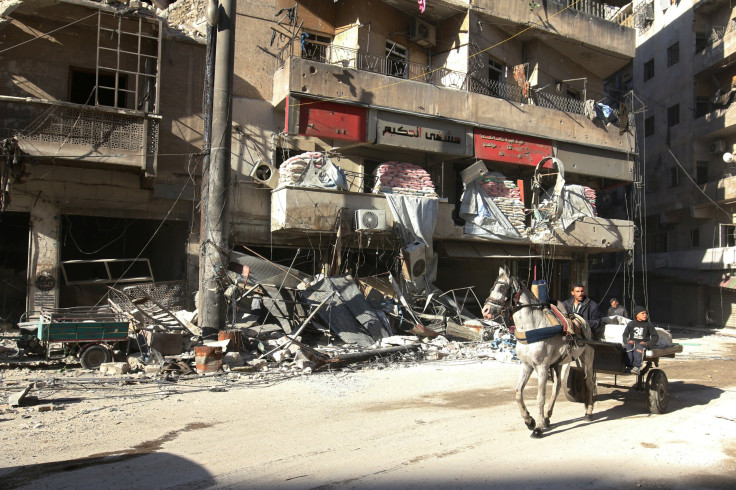
Lina Sergie Attar, a Syrian-American who was raised in Aleppo and co-founded the Karam Foundation, a non-profit organization focused on building a better future for Syria that sends relief to Aleppo, told IBT all humanitarian paths into her home city have been indefinitely shut down by Assad's regime.
"It’s extremely dangerous to perform humanitarian work as it’s illegal to do pretty much anything in Syria," said Attar, who has struggled to deliver aid to Aleppo since the summer. "When we function in Western Aleppo, everything is completely underground, in secret. Everyone does their humanitarian work in secret because they're terrified of being detained or killed."
The Karam Foundation saw several of the aid projects it has backed in Aleppo fall victim to the airstrikes in recent months. "We’ve had a water well targeted by a Russian airstrike," Attar said. "A bakery we were supporting was destroyed. We had an infant formula milk center badly damaged more than once, and moved it around to three different locations. Now, there are no more milk centers in Aleppo."
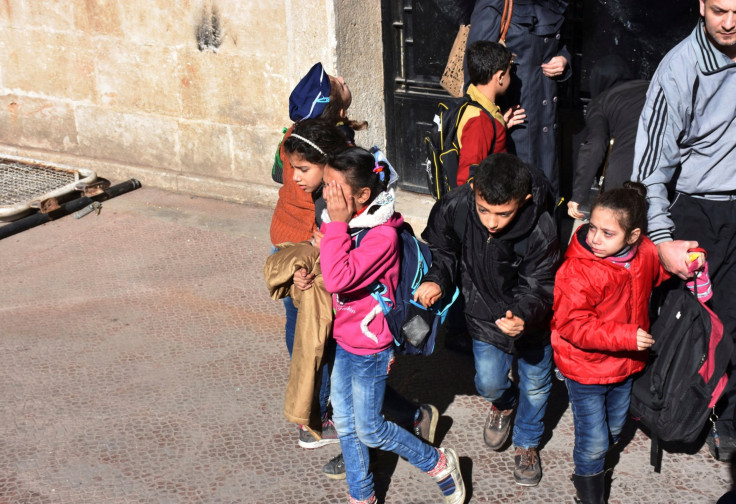
Aleppo, one of the world's oldest and most historic cities, has been decimated by the Syrian government, rebel forces and an international coalition purporting to wipeout the presence of the Islamic State group in the region. Russia has played a major role in deploying airstrikes throughout the region since anti-government protests during the Arab Spring in 2011 erupted into a full blown civil war in Syria. But for Syrians on the ground, that battle seems less like a fight against ISIS, and more of a long term genocide targeting children and innocent civilians. Roughly 11 million Syrians have fled their homes since the conflict began.
A United Nations envoy carrying food and aid to Aleppo was targeted in an airstrike reportedly backed by Russia in September, making it even more frightening for volunteers and citizens to go outside in search of shelter. Since then, attacks targeting civilian entities have been at an all-time high.
Ahmad Aziz, programs officer for the Big Heart Foundation, a non-profit dedicated to providing impartial humanitarian for Syrians by partnering with the World Food Programme and multiple other NGOs, said his commitment to Aleppo hasn't stopped, even while facing his own crisis. He’s rationed just two months of food he’s been able to store in his home. When that runs out, he's not sure what will come next.
"Even if the air raids stopped, people don’t have resources or options to get food. There are only three items remaining in all of the markets: radish, parsley and spinach," Aziz told IBT via WhatsApp.
Aziz said his city needs its people to take care of each other through these darks times, even when they don't have the resources to take care of themselves. "We have a famous saying in Arabic: the shoemaker is barefoot, the tailor is naked and the carpenter's door is broken," Aziz said.
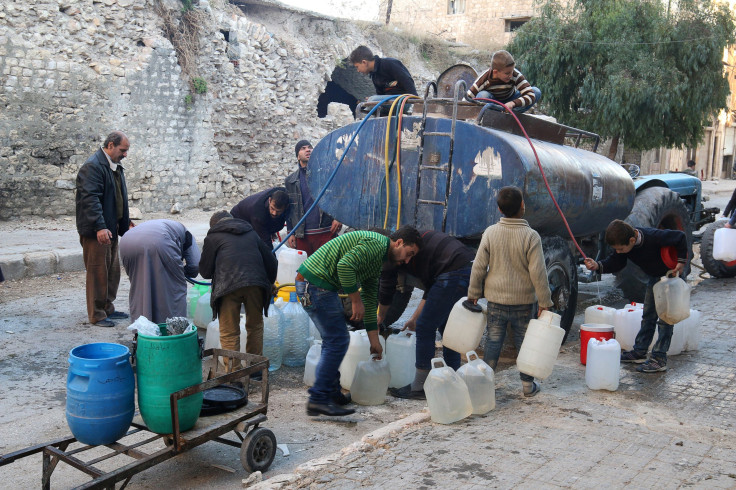
Alhamdo and others trapped in eastern Aleppo were at least able to find some essential supplies and food during the summer months through underground humanitarian aid. Now, his family is left lacking crucial, life-saving resources.
"My sick wife, I couldn’t find paracetamol, just a mere paracetamol, I couldn’t find for her," he said. "The first time I tried to take her to a hospital, they couldn’t take her because there were too many people. The second time, they refused to accept her for the same reason. The third time, all of the hospitals were targeted so I couldn’t continue, I went back home."
Still, several of the organizations working to put an end to the bloodshed in Syria remain hopeful. Those humanitarian agencies noted the international community should join their efforts by donating and reaching out to their local representatives.
"Solutions have to be political," Omar Sawan, international programs relations manager for Islamic Relief USA, told IBT. "If people were to urge their governments to make serious attempts at resolving these problems, it would be more effective to providing relief to Syrians. It’s a complex situation in Aleppo that’s still unfolding, and threatens to expand. Reaching out to local politicians and asking them to support political resolutions to the conflict would be the best way to help Syrians in this moment."
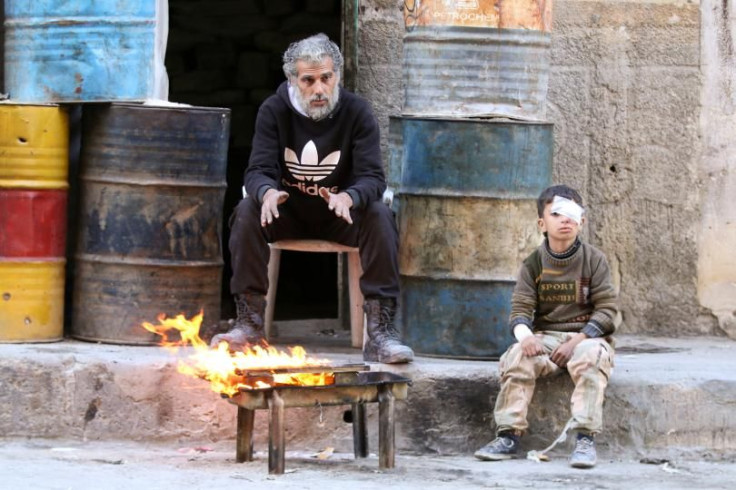
Attar also stressed the need for a collective global response to the humanitarian crisis facing the region.
"What’s happening in Syria right now is a blemish on our entire collective humanity," she said. "This is the largest humanitarian crisis of our lifetime. Aleppo has been destroyed by wars before and it will be rebuilt again. You’ll never be able to extinguish Aleppo. The world really needs to think about their roles in helping the Syrian people or watching in silence."
As for the Syrians remaining in Aleppo, the city’s walled off borders hasn't stopped them from engaging with the worldwide web. Each day, residents share photos with journalists through Whatsapp and other encrypted messaging apps to avoid government surveillance. They watch international news reports, and have thoughts for global audiences watching the developments unfold online, as well as for the next president of the United States, billionaire Donald Trump.
"For all who are listening now: Please forget your nationality. Forget your religion. Forget your political views. And remember your humanity," Alhamdo said Tuesday. "Those people who are now surrounded inside Aleppo, they are being killed every day with all kinds of weapons. They are dying because of fear, they are dying because of pain, they are dying because of hunger, they are dying because of diseases… Just imagine if these people who are in hunger were your children. This is my message also for Trump."
© Copyright IBTimes 2025. All rights reserved.






















